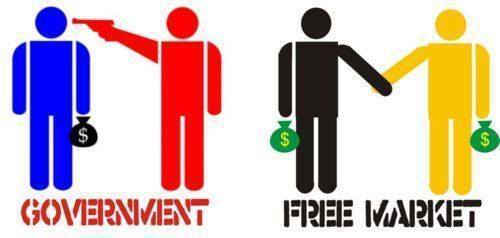A Market in Governance

In a market system, you buy what you want. This means that prices are determined by the aggregate of all purchases. In a political system, the government decides what you buy and how much everyone collectively pays for that purchase. The government decides how much money will be put into its functions and what the rate of taxation will be.
This is the fundamental antagonism between the market and politics. The market is ruled entirely by the choices of the buyer; politics, to the contrary, is ruled by the choices of the government. Even if there is wise and just governance, it can never be governance in accordance to the wishes of the public as governance by nature ignores the public.
But it is theoretically possible that there is a combination of markets and governance. There could be libertarians that do not want to give up government for a private law society and non-libertarians who don’t think any non-governmental alternative is a sufficient replacement to the government. If there has to be a government, and if that government has to govern, how could it do so according to the principles of the market?
Democracy is obviously insufficient as it is both collective in the determination of producing goods and the purchase of those goods. Democracy could hypothetically be superior to autocracy or oligarchy, but it is in no way similar to the market system. When faced with this question most people will give up and concede that the two real options are laissez-faire anarchism or minarchism. The government ought to be reduced to the smallest role it can possibly play and the market system ought to do everything it can do.
But is there a possibility to somehow integrate these two systems? Is there some form of governance that can work as the market does despite there being a monopolist who controls a vast amount of services within a society.
True monopoly is the State giving a business or itself the right to exclusively control some area of business. And the State could theoretically be reduced to such an actor on the market. The State would still keep the monopoly it has, however, rather than forcing people to fund the monopoly, the State could instead offer its services on the market.
This would imply reducing the State to voluntarily of ering its services, rather than compelling payment. This would also imply the end of taxation. Services could then be funded by individuals or communities purchasing them. This is without getting into the details of how communal purchases ought to work.
But since the services the State offers are still monopolistic, they can never really function according to the market and will form instead a pseudo-market. The prices will be set higher than the market would allow. And since, contrary to popular belief, costs are determined by prices, the services offered by the State will always be more inefficient as the State is able to charge higher prices. More money does not imply a better service, but rather a more bureaucratic and slower one.
But is there still a way in which the government can retain its control over the violence in society to allegedly prevent chaos, yet still function according to the market system? Can there really be some equivalent of free pricing within a government? After all, if there is need for a central agency to govern and if the market is superior to the State, it should be the highest priority to ensure that there can be a government that can function on the market.
And this is easy, the government must allow other competing governments or even non-governments. If it is true that a government is necessary, all the competition will be governmental. This is not only the indirect competition provided by mobility, but direct competition. In essence, the State must concede all it’s territory if it can no longer be the best provider of services in that territory. The State is reduced to a market entity like any other.
If the State does not claim any territory it does not follow that the State is necessarily abolished. But this model is also fully compatible with abolishing the State, that is simply removing any special privileges the State still claims. If we want to abolish the State while retaining governance, we can do that simply by leaving what used to be the State to only do that which the buyers decide. If the actions of the government are in no way privileged, it can still be a government and it can fully be on a market.
And it would still be a government, it would fulfill all the roles a government fulfills right now. It can provide defense, it can build the roads, it can regulate health and safety hazards. However, this is consensual governance, this is governance that is only funded insofar as people buy what it offers. This form of governance is truly economic governance and also fully conforms with the principles of voluntaryism.
[For books and more essays visit www.insulaqui.com]